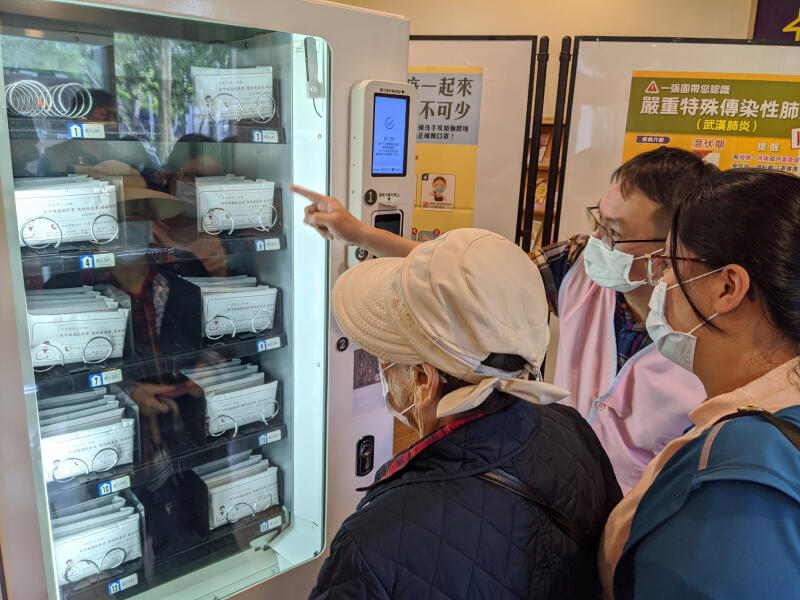Coronavirus: Taipei unveils vending machines for surgical masks
Sign up now: Get insights on Asia's fast-moving developments

The machines were modified by manufacturers from those that used to dispense candy and SIM cards.
ST PHOTO: KATHERINE WEI
Katherine Wei
Follow topic:
TAIPEI - It is now supposed to be easier to get hold of a surgical mask with vending machines dispensing them.
"It's so convenient that we have this in public spaces. We won't have to line up at pharmacies any more; when the time comes, we just put our card in (to these machines)," said Ms Cheng, a housewife in her 40s, who was at the Xinyi District Health Centre on Monday (April 13) to collect her fortnightly allotment of masks with her husband.
The vending machines are part of a bid by the authorities in Taiwan to reduce face-to-face contact and make surgical masks more accessible to the public while sticking to the rationing policy on the island.
As of now, each Taiwanese resident with a National Health Insurance card is allowed to buy a set of nine masks every two weeks from pharmacies or through the National Health Insurance app, and the same quota applies to the vending machines.
Unveiled by the Taipei City Government and the Central Epidemic Command Centre (CECC) on Saturday for a week-long trial run, the three machines installed near Taipei 101 were modified by manufacturers from those that dispense candy and SIM cards.
Taipei Mayor Ko Wen-je disclosed on Saturday that he had tasked a team of experts to work out a safer and more efficient way for people to obtain masks rather than having long queues at pharmacies.
"We're hoping to remove the risks of human interaction that happens when one buys masks from pharmacies," said Mr Lu Hsin-ke, commissioner of the Taipei City Government's Department of Information Technology, told The Straits Times. Mr Lu's department worked closely with the CECC to make sure that the database of the National Health Insurance system, which tracks each citizen's health records, and mask-buying as well as travel history, will be in the vending machines.
Just like buying government-issued masks from pharmacies, customers are required to provide their National Health Insurance card, which allows the machine to scan for previous mask purchase records.
Currently, each pharmacy receives a daily quota of 200 sets of masks to sell to the public and every machine has 300 to dispense daily but will be refilled if the stock runs out early.
"The three machines dispensed 700 sets of masks over the first two days," said Mr Lu, who added that they are in operation only when the Xinyi District Health Center was open. Mr Lu's team asked mask buyers to fill out surveys right after using them on Sunday, and some 85 per cent of customers reported that they were "satisfied" or "extremely satisfied" with the experience. Almost all or 90 per cent said they would be using the vending machine again in the future.
The machines do not accept cash; buyers can tag their EasyCard - Taiwan's stored-value card for public transportation and convenience stores - or use credit cards and payment apps.
"Once the week-long trial is over and some technical issues perfected, the city government plans to install mask vending machines in all 12 administrative districts across Taipei," said Mr Lu, who added that the CECC is planning a similar rollout in other cities and counties in Taiwan.

